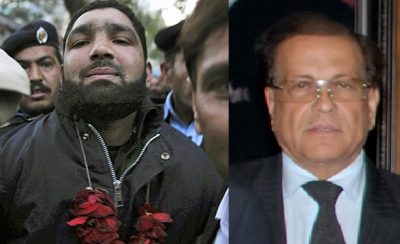By
Sattar Rind
Mumtaz Qadri, the confessed killer of Pakistan People’s Party politician and ex-Governor of the Punjab province Salmaan Taseer, was executed at the Adiala Jail in Rawalpindi at 4:30am on the morning of February 29 2016.
Qadri’s hanging has surprised many who thought such a move would spark a severe backlash from the religious lobby. Governor Taseer, one of the most prominent liberals in the country and known to be an outspoken critic of the country’s harsh blasphemy laws, arguing that they discriminated against religious minorities and seeking liberal reforms, was murdered in 2011.
Before his assassination, the liberal people of Pakistan had called for a pardon for Asia Bibi, a Christian woman who was sentenced to death in 2010 in a blasphemy case in a lower court in the Shakhapura district, 30 kilometres from the Punjab capital city of Lahore.
Mumtaz Qadri, a former police commando and security guard of the Governor, assassinated Salmaan Taseer in Islamabad’s Kohsar Market on January 4, 2011 for his support of the blasphemy accused Christian, Asia Bibi. The Anti-Terrorism Court (ATC) convicted and condemned Qadri to death – a ruling also upheld by the Islamabad High Court and Supreme Court. Again he went for a review in the Supreme Court but it was also rejected in December 2015.
Salmaan Taseer only wanted that such law should be transparent and must away from public pressure. It was a fact that when one labelled an allegation of blasphemy on anyone then everything went against him or her and justice ceased to be free and fair due to Mullahs mounting great pressure on the accused. Either he was guilty or not.
Everyone associated with such cases does not somehow follow the rules and regulations or go after the facts as they suddenly face public sentiment and are in great fear of their reaction, such a law being a very sensitive issue in Pakistan.
This is what Salmaan Taseer wanted, that the law should also attend to these weaknesses, necessary for transparency in justice. Killing an innocent human being by any means is equal to killing humanity in Islam. Taseer was emphasizing that if anyone is accused of blasphemy and is proven to be wrong then there should a punishment for the accuser too. But it was another sorry state, what we saw was that even judges in court remain under great pressure to provide justice according to this liberated consciousness.
Salmaan Taseer always advocated that the law had always been used against the minorities of this country. He never went against this law, the Supreme Court observing as a false accusation against him, warning that ‘at the time in Islam a false accusation can be as serious as the blasphemy itself, and that calls for blasphemy law reform’, “ought not to be mistaken as a call for doing away with that law.”
However on the day of his assassination, Salmaan Taseer visited one of his friends, informally at Koshar Market, a very small market of élites near to his house in Islamabad. When he finished his cup of coffee and was moving towards his car, his guard Mumtaz Qadri killed him by shooting him with an AK-47 rifle, firing 27 bullets into his body.
Later in a 40-page statement submitted to the court, Qadri said that at the time, Taseer’s statements in support of Asia Bibi, the Christian woman charged with blasphemy, had provoked him to kill the governor.
Surprisingly, instead of condemning this action, all the Mullahs and their followers praised his action and he became a hero within a few hours to his like minded people. This shocking news became more painful when Khawaja Muhammad Sharif, a former Chief Justice of Lahore High Court, announced that he would defend Mumtaz Qadri in court, along with almost 300 advocates.
Among these advocates was Shaukat Aziz Siddiqui, who kissed Qadri openly in court before the ATC judges out of emotion when Qadari was remanded by police for further investigation. They also showered him with rose petals. Incidentally, Mr. Shaukat Aziz Siddiqui was later appointed a Judge of the Islamabad High Court.
Nevertheless, after an eight month hearing, the ATC in Rawalpindi sentenced Qadri to death twice over by hanging. Soon after the decision however, the ATC judge fled the country following death threats to him and his family.
Mumtaz Qadri appealed against the court’s decision in Islamabad, though after a long hearing the court upheld the lower court’s earlier death sentence, but struck out a terrorism conviction, making it likely he would soon be executed.
The Government of Pakistan went against the Islamabad High Court’s decision in the Supreme Court and upheld the first decision of the Anti Terrorism Court, rejecting Islamabad’s decision. Mumtaz Qadri again requested a review of the decision but on December 9th 2015, the Supreme Court found nothing to be reconsidered and the decision stood.
Now there was only one chance to free Qadri or change the death sentences into life imprisonment by the President of Pakistan accepting his petition for mercy. However, without any public announcement the President shifted his family from Karachi to Islamabad, an indication that the government was not going to accept Qadri’s appeal, which is exactly what happened.
On Sunday February 28th, 2016 Mumtaz Qadri’s family was informed that Qadri wanted to see them as he was not feeling well. When they reached Adiala Jail they came to know that it was their last meeting.
It has been termed by many liberals and democratic people of Pakistan ‘A Justice with Pakistan’.



No Comments Yet!
You can be first to comment this post!